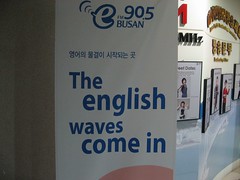The decision to move out of my mother-in-law’s apartment set in motion a lot of unintended consequences. One of these was the surprising declaration by Korean Mother that because she intended to spend most of her days out of the apartment, or engaging in bouts of potentially uninvited babysitting at ours, she wouldn’t be in a position to keep the dog called Max we’d rescued three years ago and given to her to keep her company.
It was always clear we wouldn’t be taking him with us, because he doesn’t like to be poked and our son is very much at the poking stage, though I think he’s showing signs of graduating to tail-biting. The other problem was that if Max felt he’d been slighted in some way, he’d take revenge, and it got to the point where scolding him for something would almost inevitably lead to him urinating on one of the beds in the house, and if he needed to wait a couple of days to pick his moment, then he would. Max is a dog that plots against you.
So plans were hatched to send him down to Namhae to stay with my father-in-law and his father, who eventually vetoed the plan. It was probably a lucky escape for Max anyway. I met a dog on their farm once. It was tied up by a short rope walking around in a puddle of its own urine in the freezing cold, and it was pleased to see me in a way that was so friendly it suggested a certain form of madness and the impossible hope of rescue. The next time I went to Namhae, the dog was gone. I think something bad happened to him but I didn’t want to to ask. That was a ‘working dog’ I was told, so Max would be treated differently, but I had my doubts. Most Koreans are coming to terms with being the first generation of keepers of dogs as pets, and it shows.
Without the easy option of the Namhae plan we were back at the status quo ante, and between everything else that was going on at the time, Max’s situation was not the foremost one in my mind. But what I didn’t expect to happen was for my wife to suddenly tell me at 4.50pm on some random Sunday that his new owners were coming to collect him in ten minutes. Max has bitten me badly enough to draw blood three times, once very early on when we were establishing our levels in the pack and twice I think in the mistaken belief that he was protecting our baby. So there have been long periods when there has been no love lost between us, but I have played with him a lot, and there was a time when I considered him my only friend in Korea, so I suppose when it came down I was rather attached to him, for all his faults.
I’d scolded him at lunchtime because he’d been trying to bite a towel on the floor, and with the handover now happening fifteen floors below me outside our apartment building after vital time had been spent with my wife who was trying to calm me down, it promised to be the last interaction Max and I ever had. Maybe ending things that way shouldn’t have mattered, but it did.
I rushed down to try and say this sudden and unexpected goodbye. None of it was very pleasant as my wife and mother-in-law were both upset and I was angry about not being told of this development. I might not speak the language but at one point I broke etiquette and deliberately stared at my wife’s mother in order to convey my feelings towards her. To my mind Max was part of the family and she’d made the decision autonomously with people we didn’t know anything about, and she had also failed to inform anyone. I was even more angered when she eventually appeared to reluctantly accept the money the new owners had brought for her, because it turned it into a cheapened financial transaction. Later I found out that it's considered 'unlucky' - for both parties - not to pay for a dog in Korea, even if it's a token amount. Not knowing this, we'd never paid any money when we rescued Max, and there may well be those who believe that in failing to appease the Gods in this way, everything else that followed we brought upon ourselves.
As for not finding out until ten minutes before, it turned out my wife had known in the morning – which is still far too late – and in rushing out to meet a friend had forgotten to tell me. So her stock wasn’t exactly going up in this whole affair either.
It’s a sore point with me that – especially because of the language barrier – I tend to be the last to know anything in my life in Korea, both domestic and beyond, and I’m increasingly of the opinion that it’s not good enough to just excuse it as a function of language difficulties. Rather, I’m coming to the conclusion that most Koreans I know are not great sharerers of important information, not because they aren’t good gossips, because they are, but because they aren’t always good at talking with foreigners, even if they can speak perfect English, like my wife.
Apparently Max’s new owners were ‘dog people’ of long standing, who had just lost their previous pet to old age. Needless to say though, this is not an ideal way to transfer ownership of a dog. But when the status updates came in, it was all positive. They’d taken him home, let him run around the garden of their house which he’d greatly enjoyed as I can imagine, and then they’d given him a bath and gone out and bought a new house and basket for him along with other items. The husband would take Max for walks by the river in the morning, and the wife stayed at home during the day, ensuring Max would have a happier life than we had been able to provide for him. I made my peace with it and wished him that better life.
The next day they brought him back. He’d growled at the husband and he’d refused to eat. And while the couple might have been dog people of many years' experience, they apparently didn’t know much about adjustment periods, or perhaps it finally dawned on them that when we said Max had a troubled early life and needed a good home with patient owners, this was really meant. So they had second thoughts, or no patience, and Max came back, but he still needed a new home and I was sure it would be worse than the one he had for a day.
Predictably I wasn’t told Max was returning either, so the first I knew of it was when I heard the familiar sound of his feet on the floor.
We moved out and Max disapproved of it. So he decided to step things up a gear, by urinating and defecating everywhere every time my mother-in-law went out. Despite this, I wish I found out what she was going to do before she handed him over to a government-registered kennel to be re-homed, because I believe they are inherently untrustworthy and there’s always the thought at the back of your mind that they will find ways of creating spaces in their kennels whatever it takes, even if officially their government registration supposedly guarantees that they will never put a dog to sleep.
Max was probably traumatised by being separated from his mother after six days, and he never recovered from it, becoming a victim of this country’s general attitude towards dogs, if not – I increasingly feel - its general attitude as a whole. So when he had his lucky breaks he didn’t make the most of them, but while I was sympathetic I also didn’t know what to do because he was unmanageable and untrustworthy. You can’t easily have an untrustworthy dog in your apartment when you have a baby.
Still, I hatched a plan to rescue Max if he hadn’t been re-housed within a few weeks, although I didn’t tell my wife and I didn’t know how the idea would be received. The plan involved taking Max back and bringing him to our apartment despite his problems – where I would take him out every morning to exercise and tire him to see if this altered his behaviour for the better. Then, if it didn’t, he might have to go back to the kennel. But it wasn’t to be. Officially, Max was re-housed after two weeks, and that might be really what happened, or he might be dead, but either way it’s over and I’ll never know the truth.

